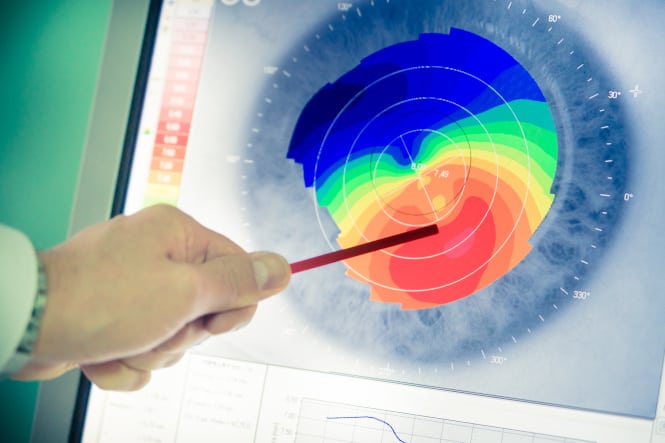Find Out Whether You’re a Candidate for Cross-Linking at Durrie Vision in Overland Park, Kansas
Vision correction patients cite many reasons for undergoing LASIK surgery and other vision procedures to improve their eyesight. But for people with keratoconus, laser vision correction is something that can only come after their eye disease is addressed.
Keratoconus is considered rare; it occurs in one in 2,000 people, and typically begins in puberty. If you’ve been diagnosed with keratoconus, and you want to improve your vision, your first step is to find out if you’re a good candidate for a specialized treatment at Durrie Vision in Overland Park, Kansas.
And the only way to do that is by requesting a free consultation on our website, or by calling
(913) 491-3330.
I’ve Been Diagnosed with Keratoconus. What Is It?
Before we explain what keratoconus is, you need to know a couple of things about basic eye anatomy. Your cornea is the clear window at the front of your eye; it is responsible for focusing light into your eye. A healthy cornea is dome-shaped.
When your cornea progressively weakens and thins due to keratoconus, it begins to bulge like a cone. The incorrect cornea shape makes your vision blurry or distorted, and symptoms worsen as the condition progresses – as the cornea becomes more conical.
Keratoconus begins when people are in their late teens to early 20s. In some cases, keratoconus is suspected to be genetic, but it also can be associated with eye allergies, excessive eye rubbing, or connective tissue disorders like Ehlers-Danlos Syndrome.
If keratoconus is left untreated, a corneal transplant may be required – although symptoms usually worsen slowly over 10 to 20 years, and scar tissue can form on your cornea.
Early symptoms include blurry or distorted vision, eye redness, swelling, glare, and sensitivity to light. As keratoconus worsens, your vision gets more blurry and distorted, and eventually your nearsightedness or astigmatism worsens. If too much scar tissue forms on your cornea, you may need a corneal transplant to restore your vision.
Can I Have Laser Vision Correction with Keratoconus?
Procedures like SBK LASIK surgery, cataract surgery, or refractive lens exchange won’t correct your keratoconus. A reputable refractive eye surgeon will be up front with you about that.
Even after eye surgery, your cornea will continue changing due to active disease.
However, Durrie Vision can help halt the progression of your keratoconus and stabilize your vision through a treatment called corneal collagen cross-linking. After stabilization, laser vision correction may be possible.
So, How Can I Stabilize My Cornea?
Corneal collagen cross-linking is a non-invasive procedure that combines the use of ultraviolet (UV) light and riboflavin (vitamin B2) eye drops. It’s a safe and effective treatment that halts the progression of keratoconus and preserves your vision.
The treatment works by shortening and thickening the collagen fibers in your cornea, and creating new collagen cross-links. This stiffens and strengthens the cornea, preventing it from becoming more conical, and sometimes helping it return to a more dome-like shape.
Will Cross-Linking Improve My Vision?
The combination of UV light and riboflavin eye drops do not correct your vision. They are designed to prevent your vision from worsening rapidly.
If you’re a candidate for corneal collagen cross-linking for keratoconus and undergo treatment, you’ll still need traditional vision correction, like your eyeglasses or contact lenses – if you can wear them – to correct your vision after treatment. And even after cross-linking, your corneas change shape, sometimes at different rates in each eye, so you may need a new lens prescription.
A laser vision correction procedure could be possible for you after your cornea has stabilized when your cross-linking procedure is complete. You’ll need to discuss this with a refractive surgeon at Durrie Vision to ensure you’re a good candidate.
What Type of Laser Vision Correction Can I Get Once My Cornea Stabilizes?
Because keratoconus can cause scar tissue to develop on the cornea, you’ll need to meet with a refractive surgeon at Durrie Vision to learn whether you qualify for laser vision correction. During your consultation, we’ll get an in-depth look at your eye health and shape to determine which type of refractive eye surgery is best for you.
Learn more about cross-linking for keratoconus at Durrie Vision so you can begin preserving your visual acuity and improving the health of your cornea today. Request a consultation to get started, and visit us at 8300 College Boulevard, Suite 201, in Overland Park, for your appointment.

Author Bio: Jason E. Stahl, MD
Top Doctors: https://www.castleconnolly.com/top-doctors/jason-e-stahl-ophthalmology-129cc002150
Best Cataract Surgeons: https://bestcataractsurgeons.com/cataract-surgeons/jason-e-stahl/

